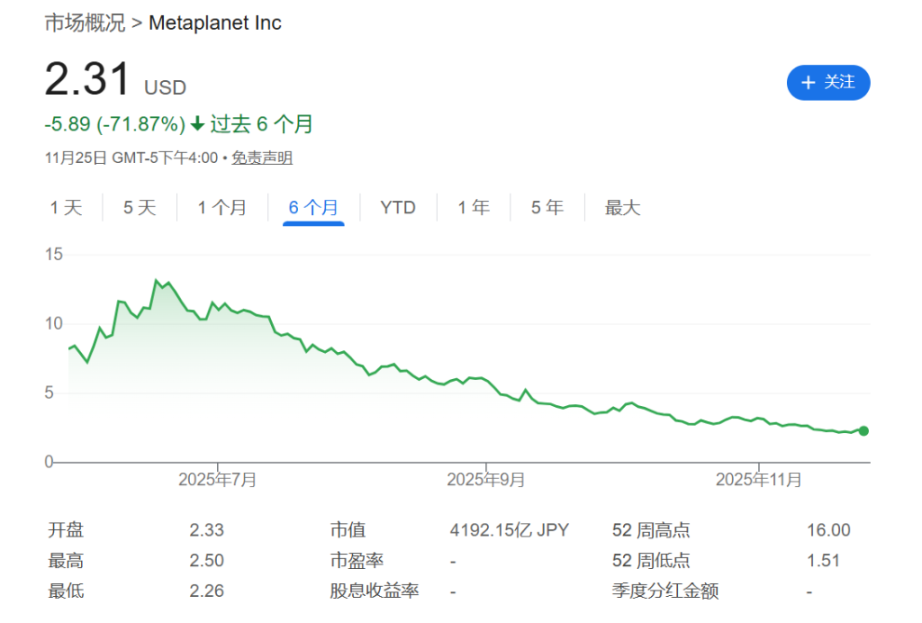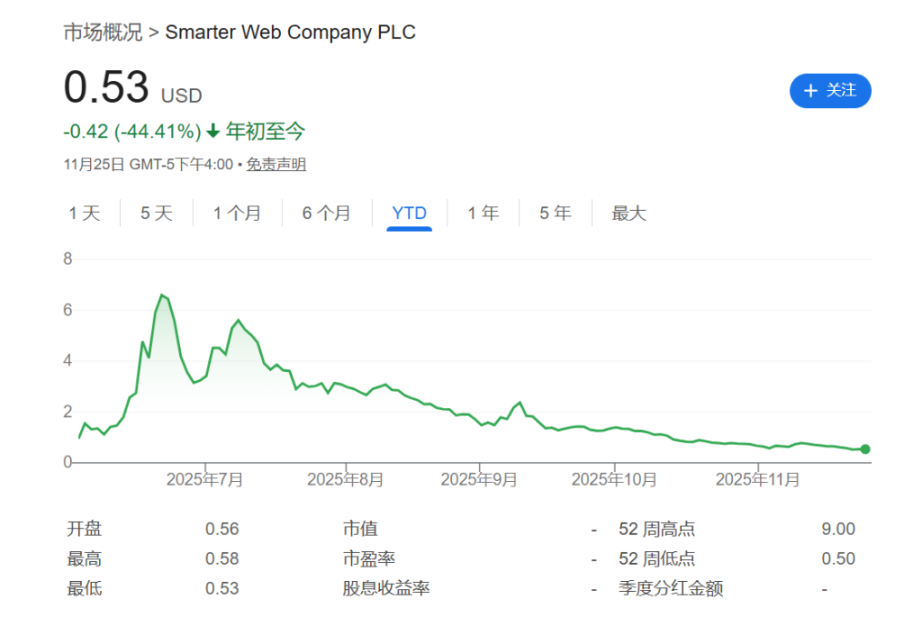"Myth of the 'Crypto Treasury' Shattered? Stock and Token Prices Plummet, Forcing Companies to Sell Crypto Assets"
However, as a pioneer of the "crypto treasury," Strategy has chosen to increase its holdings against the trend.
Companies that once aggressively hoarded crypto are now facing a double blow to both their stock prices and crypto holdings, with their total market capitalization shrinking by $77 billions recently. The share prices of related companies have generally plummeted by more than 40%. To protect themselves, many firms are being forced to reverse course, selling off crypto assets to buy back shares or repay debt, falling into what analysts call a "vicious cycle." However, Strategy, the pioneer of the "crypto treasury" model, has chosen to go against the trend and increase its holdings.
Written by: Long Yue
Source: Wallstreetcn
The once cutting-edge corporate "crypto treasury" model is now rapidly losing its luster amid a chilly market.
According to the Financial Times on November 26, as the crypto market suffers heavy losses, companies that once stockpiled crypto assets to bolster their treasuries are now facing a double hit to both their stock and token prices. To support their plummeting share prices, they are being forced to sell off their digital tokens.
According to data from The Block, the market capitalization of these treasury companies—who mainly purchased crypto through debt and equity financing—has evaporated by about $77 billions since peaking at $176 billions in July.
This reversal stands in stark contrast to last year's optimism after Trump promised to make the US the "crypto capital." Now, investors worry that a business model reliant on rising crypto prices and large-scale equity and debt financing is seeing its virtuous cycle break down.
Strategy (formerly MicroStrategy), the world's largest corporate bitcoin holder led by Michael Saylor, has seen its share price plunge 50% in the past three months, dragging down many imitators. Currently, the company's market capitalization is even lower than the value of its bitcoin holdings, further fueling market concerns.

Stock Price Plunge, Market Cap Below Crypto Holdings
The failure of the "crypto treasury" strategy is most evident in share prices. In addition to Strategy, Japan's largest bitcoin holder Metaplanet has seen its stock price plunge 80% since its June peak.

Smarter Web, the UK's largest bitcoin buyer, has also seen its share price fall 44% this year. The company is valued at £132 million, while its bitcoin holdings are worth about $232 million.

Adam Morgan McCarthy, Senior Research Analyst at crypto data firm Kaiko, said: "These companies will see liquidation-style sell-offs, and things will get worse. It's a vicious cycle. Once prices start to plunge, it triggers a race to the bottom."
Jake Ostrovskis, head of OTC trading at Wintermute, also believes that sell-offs in digital asset treasury stocks are "inevitable" because "there are just too many of these companies."
Strategy Reversal: Selling Crypto Assets for Self-Rescue
Facing a harsh market environment, many companies have begun to reverse their strategies, selling crypto assets to fund share buybacks or repay debt.
North Carolina-based ether holder FG Nexus recently sold about $41.5 million in tokens to fund its share buyback program. The company's market capitalization is $104 million, less than its $116 million in crypto assets.
Florida-based life sciences company ETHZilla also sold about $40 million in tokens for share buybacks.
French semiconductor company Sequans Communications sold about $100 million in bitcoin this month to repay debt. The company has a market capitalization of $87 million, while its bitcoin holdings are worth $198 million. CEO Georges Karam said the sale was "a tactical decision aimed at unlocking shareholder value in light of current market conditions."
Strategy Chooses to Go Against the Trend
However, not all companies are retreating. As the originator of this strategy, Strategy has chosen to go against the trend. Despite bitcoin's price dropping from $115,000 a month ago to $87,000, the company continues to increase its bitcoin purchases.
Founder Michael Saylor is unfazed by market concerns, stating this week: "Volatility is Satoshi's gift to the faithful."
Nevertheless, analysts remain cautious about the market's future. Adam Morgan McCarthy warns that while sellers of bitcoin and ether can still find buyers, companies holding more niche tokens will face greater difficulties raising funds.
He predicts: "When a medical device company buys a niche asset in a niche corner of the crypto market, the outcome won't be good," adding that 95% of digital asset treasuries "will go to zero."
Meanwhile, Strategy also faces the risk of being removed from some major stock indices, which could put even more selling pressure on its share price.
Disclaimer: The content of this article solely reflects the author's opinion and does not represent the platform in any capacity. This article is not intended to serve as a reference for making investment decisions.
You may also like
Bitcoin price bottom due ‘this week’ with BTC down 20% in November

MSTR may be removed from the MSCI index, sparking conflict as the "Crypto Little Deng" faces off against the "Wall Street Old Deng" in a dramatic showdown.
The cryptocurrency community is strongly pushing back, calling for a boycott of Wall Street institutions and even shorting JPMorgan. MicroStrategy's founder also insists that the company is operational in nature rather than a fund.

Another EOS scandal: community accuses the Foundation of running away with the funds
Big spending: Where has all the foundation's money gone?

Doma mainnet goes live, 36 million domain names can be used as tradable tokens
The world's first blockchain compliant with DNS standards enables the tokenization and trading of premium exclusive domain names.

